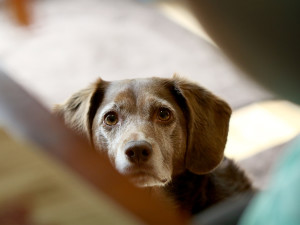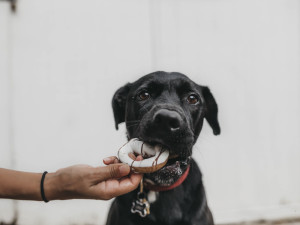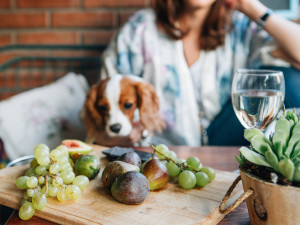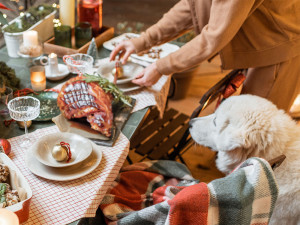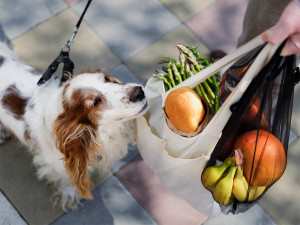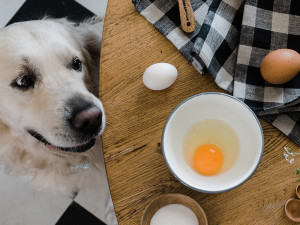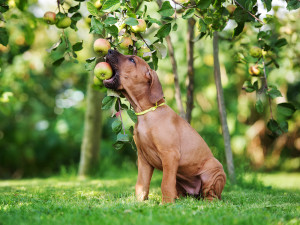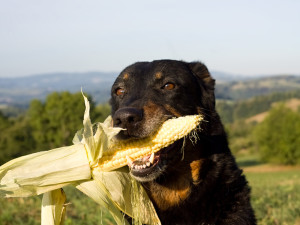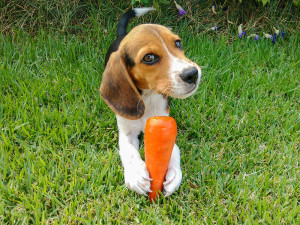Can Dogs Eat Chocolate?
No isn’t a strong enough answer here. Learn why.
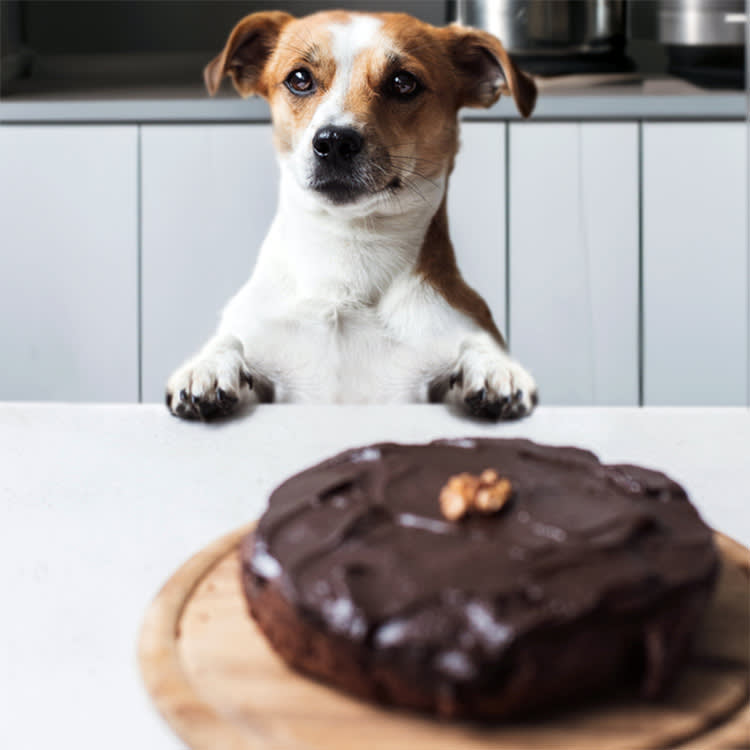
Share Article
Chocolate seems to be the perfect accompaniment to any big event — from birthdays to holidays to break-ups. And with all that leftover Easter candy lying around right now, though, you’ll want to keep an extra eye around chocolate and your pup.
Unfortunately, chocolate is toxic to dogs and is one of those foods that should never be shared. Read on to learn more about the risks of chocolate for dogs.
Nutrition facts about chocolate for dogs
Chocolate comes from cocoa beans, which are the seeds of the cacao tree. The seeds are processed into chocolate liquor, which is a paste that is then used in the production of chocolate. Chocolate is often categorized into three main varieties: dark chocolate, milk chocolate, and white chocolate.
These all have different properties with their main difference being their content of pure cocoa. They also may include additional ingredients, such as sugar, fat, vanilla, and added flavors from nuts, spices, dried fruit, caramel, and more. Additionally, there are many chocolate-flavored foods including baked goods and drinks that use cocoa powder for flavoring, like hot cocoa.

The compounds that make chocolate toxic to dogs are called methylxanthines — specifically theobromine and caffeine — found in the pure cocoa. These compounds cause stimulation of the nervous system along with digestive upset and signs, including vomiting, diarrhea, agitation, tremors, seizures, elevated heart rate, elevated body temperature, and in extreme cases, coma and/or death.
For these reasons, chocolate is never a safe food to share with your pup. Whether they experience mild signs or more severe signs of toxicity depends on many factors, including how much concentrated cocoa was in the food they ate and how big your dog is. The more concentrated the product (looking at you, dark chocolate), the more serious the potential signs will be.
It is never good for dogs to eat chocolate of any kind, and you should contact your vet and a pet poison hotline if you are concerned that your dog ingested any products containing chocolate.
Is chocolate good for dogs?
No, definitely not. Chocolate is not good for dogs and is actually toxic. It is one of those foods that surprisingly is fine for us but can be very dangerous for our pets. How dangerous it is depends on how concentrated the cocoa is in a particular chocolate item and the size of the dog. Smaller dogs will get sick from smaller quantities, while larger dogs need to eat a larger amount to feel the effects.
However, this also varies based on how concentrated the product is, so a large dog could very easily get sick from eating concentrated dark chocolate, too. Here are some of the specific reasons chocolate is toxic to dogs:
Theobromine: This is the primary compound found in chocolate that causes serious complications. In small amounts, it can cause mild digestive upset, while at higher doses it has effects on the brain, heart, and respiratory system.
Caffeine: Caffeine is also a methylxanthine found in smaller amounts in chocolate. It can cause similar signs to theobromine, including digestive upset, hyperactivity, tremors, seizures, elevated heart rate, and high body temperature.
High fat: Even if your dog does not eat enough chocolate to suffer from the toxic effects of methylxanthines, the high-fat content of many chocolate foods can cause additional problems for your pup. High-fat foods can cause digestive upset, including vomiting and diarrhea, and puts dogs at risk for more serious pancreatitis.
High sugar: Chocolate-based foods are often high in sugar, too, and this is unhealthy for dogs as well. Too much sugar can lead to weight gain and put dogs at risk for obesity-related health problems like diabetes and arthritis.
Other ingredients: Chocolate products may also contain other ingredients that are toxic or unhealthy for your dog. This includes sugar-free chocolates with xylitol, as well as ingredients like raisins, macadamia nuts, nutmeg, cinnamon, alcohol, and more.
Can dogs eat any kinds of chocolate?
No, all chocolate needs to be off-limits. While some chocolate products, like white chocolate, contain only very small amounts of cocoa, the risk is still present, especially for smaller dogs, to get very sick. And even if there is not enough pure cocoa in the product to lead to a toxic effect, your pup is still at risk from getting sick from the high-fat and high-sugar content in many of these foods, as well as any other ingredients that may be unsafe for them.
Is chocolate safe for dogs?
Chocolate is not safe for dogs at all. This cannot be overemphasized. It’s a very common reason for dogs to end up in an emergency clinic and can be a very scary experience for both pups and their parents, not to mention their wallets.
Try to do everything you can to keep chocolate out of reach including making sure your home is as dog-proofed as possible, and teach your dog to respond to cues like leave it to redirect them from unsafe situations. Of course, accidents do happen so if you discover that your dog ate chocolate, be sure to take the following steps:
Contact your vet and/or a pet-poison hotline right away so they can help you calculate how much cocoa per pound of body weight your dog ingested and how concerned you need to be.
Save any wrappers, especially the ingredient list, to share with your vet.
Head to a veterinary emergency clinic right away if you are not sure how much your dog ate, or if you are advised by a professional to seek care.
The bottom line: Can dogs eat human food?
Dogs can eat many human foods, and there are lots of options that are safe and even healthy for your pup to share. Chocolate is a good example of why it is very important to do your research, however. There are some foods that are perfectly safe for us but can cause serious illness in our pets, and others that may not be toxic but are just not healthy for them.
For this reason, try to stick to plain, whole foods like lean meats and safe fruits and vegetables. This avoids the complications of added ingredients, oils, and spices that may not be safe and is most likely to be a healthy choice for your pup, too. If in doubt, always check with your vet or a pet-poison hotline before sharing anything with your pet.
And while the occasional shared snack can be healthy and a fun bonding exercise, it’s also important to remember that your dog has unique nutritional needs and should be eating a complete and balanced dog food diet to avoid any serious nutritional deficiencies. All treats and table foods should be kept to less than 10 percent of your dog’s total diet to ensure they get the bulk of their nutrition from their dog food.
Other foods that are safe for dogs
Butternut squash can be a healthy treat for your pup.
Apples are a crunchy and juicy snack that you can share, too.
Plain, white-meat turkey and other plain lean meats can be OK in moderation, too.
Other foods that are dangerous for dogs
Gingerbread contains nutmeg, as well as lots of sugar and fat, that can be dangerous for your pup.
Pecans are also potentially toxic to dogs.
Onions and all plants in the Allium family, including garlic, chives, leeks, and scallions are considered toxic to dogs, too.
FAQs (people also ask):
How much chocolate can a dog eat?
None. Chocolate is toxic to dogs, and they should not eat it at all.
Is it OK to give dogs chocolate?
No, chocolate is toxic to dogs and should never be shared.
Why do dogs like chocolate?
Dogs are attracted to foods that are sweet and high in fat.
Is chocolate good for dogs?
No, chocolate is toxic and can even be deadly for dogs if they consume enough.
Can dogs eat white chocolate?
No. Even white chocolate usually contains cocoa, as well as being high in fats and sugars that can make dogs sick.
Is chocolate safe for dogs?
No, chocolate is not safe for dogs. It’s toxic and can cause serious illness and even death in dogs.
References:
ASPCAPro: People Foods Pets Should Never Eatopens in new tab
Merck Veterinary Manual: Chocolate Toxicosisopens in new tab
National Confectioner’s Association: Kinds of Chocolateopens in new tab

Dr. Amy Fox, DVM
Amy Fox, DVM is a small animal veterinarian in New York City with over thirteen years of experience in a mixture of general practice, emergency medicine, and shelter medicine. A lifelong animal lover, Dr. Fox studied biology in college and then worked as a veterinary nurse before pursuing veterinary school at Cornell University. Her expertise includes surgery, dentistry, and management of chronic conditions, and she is interested in toxicology, pain management, nutrition, care of senior pets, and educational outreach. Dr. Fox also enjoys writing about veterinary medicine and teaching, and her work has previously appeared in Spruce Pets. In her free time, she loves to cook, garden, go for long runs, and hang out with her goofy mixed-breed dog May, who provides never ending comic relief!
Related articles
Can Dogs Have Ham?
That might be what you’re having for dinner, but read here to see if your dog can partake.
Can Dogs Eat Asparagus?
Asparagus is a healthy snack for pups, but keep these tips in mind.
![Golden retriever looks at some eggs on the counter]()
Can Dogs Eat Eggs?
Yes, eggs are a nutritious treat for dogs.
![Ridgeback puppy eating an apple from a low-hanging tree]()
Can Dogs Eat Apples?
Here’s why this fiber-filled fruit is a healthy treat for your dog.
Can Dogs Eat Corn?
A few kernels are fine—but keep it off the cob.
![Beagle puppy dog holding a peeled carrot in its front paws sitting in the grass]()
Can Dogs Eat Carrots?
Yep—this crunchy, sweet vegetable is a great addition to your dog’s diet.

